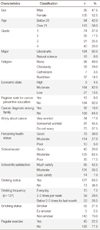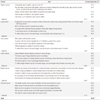Abstract
Purpose
The study was to identify the relationships between levels of knowledge, attitude and preventive health behavior about cancer in university students.
Methods
The data were analyzed with the SPSS/WIN 18.0 program. The participants of this study were 200 university students. Three kinds of instruments were used for this study, questionnaires about cancer-related knowledge, attitude and preventive health behavior from Suh et al. (1998).
Results
The mean score for knowledge about cancer was 14.33±5.32, the mean score of attitude toward cancer was 31.76±3.75 and the mean score of preventive behavior for cancer was 57.20±8.48. There was slightly positive correlation between knowledge of cancer and attitude toward cancer. There was positive correlation between the attitude toward cancer and preventive health behavior for cancer.
Figures and Tables
References
1. Korea National Statistical Office. Statistic about death and cause of death on 2008.
2. Oh BJ. General oncology nursing. 2005. 1st ed. Korea: Shinkwang Publishers.
3. Song JM. Middle school teachers' knowledge and behavior of fitness exercise. 2005. Seoul: Yonsei Univ..
5. Min HJ. A study on osteoporosis knowledge, health beliefs and health promoting behaviors among female college students. 2011. Daejeon: Eulji Univ..
6. Choi GH. A study on middle·high school students health knowledge and health behavior. 2000. Seoul: Kyung Hee Univ..
7. Mager RF. Developing attitude toward learning. 1978. Belmont: Fearon Publishers.
8. Lee WJ. Health practices of university students. Korean J Health Promot. 1999. 16:157–171.
9. Promoting health through schools:report of a WHO Expert committee on comprehensive school health education and promotion. 1997. Geneva: WHO.
10. Perry CL, Jessor R. The concept of health promotion and the prevention of adolescent drug abuse. Health Educ Q. 1985. 12:169–184.

11. Yarcheski A, Mahon NE. A causal model of positive health practices: The relationship bet ween approach and replication. Nurs Res. 1989. 38:88–93.
12. Ru EJ, Kwon YM, Lee GS. Social-psychological health and health promoting lifestyle practice in college students. Korean J Health Promot. 2001. 18:49–60.
13. Yoon HS, Cho YC. A study on the preventive attitudes and health behavior of life-style related diseases in college students. Korean J Health Promot. 2005. 22:229–244.
14. Kang CR, Kwon SN, Kwon HR, Park SK, Song IH, Oh HI, et al. Correlation analysis of perceived stress and smoking status among smoking university students. J Nurs Acad Assoc Ewha Womans Univ. 2003. 37:125–142.
15. Song JY. Perception of and pattern of alcohol consumption and their effects on health-related behavior among college students. 2008. Wonju: Sangji Univ..
16. Han GS. The relationship between self-efficacy and health promotion behavior and stress symtom of university students. J Korean Acad Nurs. 2005. 35:585–592.

17. Park OS. A study on cervical cancer knowledge, attitudes, and practice of some of the women in Busan city. 1993. Busan: Inje Univ..
18. Suh SR, Chung BY, So HS, Tae YS. A study to advance the development of educational programs for the early detection and prevention of the five major cancer in Korea. J Korean Acad Adult Nurs. 1998. 10:268–280.
19. Park SY. The effects of cancer prevention and early detection education on cancer related knowledge, attitude, and preventive health behavior of middle aged woman in Korea. 2000. Daegu: Keimyung Univ..
20. Jung GY, Park JS, Kim HO, Yun MO, Moon MY. A survey of nurses' and doctors' knowledge toward cancer pain management. Clin Nurs Res. 2004. 10:111–124.
21. Kim SK. Knowledge, attitude, and preventive health behavior of high school students on the six most common cancers in Korea. 2004. Daegu: Keimyung Univ..
22. Kim YS. The relationship of knowledge, attitudes about cancer and health behavior for cancer prevention in high school students. J Korean Acad Child Health Nurs. 2010. 16:102–111.

23. Lee YN. A study on knowledge, attitude, and preventive practice of cancer in middle school students. 2009. Jinju: Gyeongsang National Univ..
24. Hwang HG. Factors affecting university students' health promotion behavior. 2008. Daegu: Daegu Haany Univ..
25. Lee CG. A Study on the correlation between junior college physical education majors' levels of health information and attitudes/behaviors to good health. 2004. Seoul: Myongji Univ..
26. Jeon MJ, Kim BH, Lee KS, Mo SM. A survey of fast food dining out behaviors. J Korean Home Econ Assoc. 1990. 28:15–28.
27. Sim SS. A study on leisure functioning differences in college students. Dankook Univ. faculty research papers. 1998. 32:653–658.
28. Lee KS. The relationship between type of leisure activity and subjective well-being. Korean Philosophical Association. 2002. 10:80–90.
29. So HS, Suh NS, No YH. A study on knowledge, attitude and behavior related to early detection and prevention of five major cancer. J Korean Acad Nurs. 2000. 5:119–133.
30. Ko GW, Lee DH, Lee YH, Son HS. A study on knowledge and attitude about uterine cervical screening and its utilization among women in a district of Busan city. J Korean Soc Matern Child Health. 2002. 6:93–104.




 PDF
PDF ePub
ePub Citation
Citation Print
Print








 XML Download
XML Download